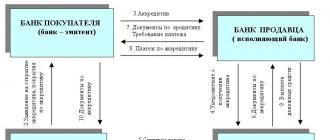Having decided to take such a responsible step as concluding a loan agreement secured by real estate, it is worth figuring out what are “ pitfalls» mortgages. A large amount of credit, a long term of payments entail the appearance of these " pitfalls» mortgages, among which are additional costs during registration, the risk of losing the mortgaged object, the bank's ban on transactions with the subject of mortgage or early repayment of the loan.
Additional expenses
This is the most common, one might even say, guaranteed "pitfall". The amount of the down payment and the state duty to the registration service are not the only expenses that you have to face in order to receive the coveted money.
Commission of the bank
Banks often charge for any small service rendered to a client. So, when drawing up a mortgage loan agreement, the borrower may face one of the following commission payments:
- for consideration of the application,
- for issuing a loan
- for transferring money from an account,
- for currency exchange (for currency loans),
- for the issuance and maintenance of a bank card.
Payment for insurance and appraiser services
Today, mortgages are quite popular, so many borrowers are morally and financially prepared to pay for the services of an appraiser and insure the object transferred to the mortgage. But this is not all that banks require in order to reduce their risks.
In addition to insurance of loss or damage to the apartment, one of the conditions for obtaining a mortgage may be
- life and health insurance of the borrower,
- insurance of the borrower's ownership of the collateral,
- insurance against the risk of violation by the borrower of the terms of the loan agreement.
In all these cases, insurance is issued in favor of the bank, it is indicated in the insurance contract by the beneficiary. And the borrower has to pay for it - in the amount of 0.5 to 1.5% of the total loan amount.
As for paying for the services of an appraiser, a problem may arise if you decide to refinance your mortgage at another bank. This usually means that the loan is paid off to the first bank ahead of schedule, and a new loan agreement is concluded with the second, at a lower rate. Banks work with a certain appraiser, and they do not trust everyone else. Therefore, in the case of re-crediting, most likely, you will have to do (and therefore pay) an assessment again.
Rules of the contract restricting the rights of the borrower
Here one can highlight
- standard rules established by law (Civil Code of the Russian Federation, the law "On Mortgage (Pledge of Real Estate)" or common in the business turnover of banks;
- various “tricky points that put the borrower in a dependent position.
 Among the first are a ban on the sale or transfer of a mortgaged apartment for rent without the consent of the bank, a ban on its redevelopment or any actions with an apartment that may reduce its value. You can't argue with these points. It is necessary to take them for granted and take into account their presence when planning any actions with collateral
Among the first are a ban on the sale or transfer of a mortgaged apartment for rent without the consent of the bank, a ban on its redevelopment or any actions with an apartment that may reduce its value. You can't argue with these points. It is necessary to take them for granted and take into account their presence when planning any actions with collateral
Among the second - a ban or serious restrictions on early repayment of the loan, allowing the bank to change the interest rate without the consent of the borrower. Since such clauses often violate general principles of civil law and worsen the situation of the borrower in comparison with the rules provided for by law, they can be challenged based on the Consumer Protection Act.
Risks associated with the situation in the foreign exchange and financial markets, in the real estate market
Fluctuations in the exchange rate, the collapse of the real estate market - all these circumstances cannot be predicted by an ordinary citizen. Moreover, mortgages are often taken for a long period, which makes the reliability of forecasts doubtful. Meanwhile, for the borrower, the above changes may entail
- actual increase in monthly payments,
- multiple excess of the loan amount over the market price of the collateral property purchased for credit funds.
To avoid dependence on the exchange rate and the situation of the world economy, it is worth taking loans in rubles, as well as avoiding the terms of an agreement on interest with a “floating rate”. The latter is positioned as beneficial for the borrower, because initially it will be lower than the usual market (or offered by the same bank) fixed rate. However, the real purpose of the "floating rate" is to reduce the risks of the bank in the event that there is a downturn in the economy. The change in the size of the “floating rate” is associated with a change in the so-called offer rates for loans on the financial exchange.
Russian banks use LIBOR (the offer rate from the London Financial Exchange) or MosPrime (the rate for granting ruble loans on the Moscow market). Few of the borrowers understand the essence of these rates, the reasons for their decrease or increase. Having concluded an agreement with a "floating rate", you can never be sure how much interest you will have to pay to the bank again.
Risk of losing collateral
Of course, such a massive object as real estate cannot be "lost" - but it can be destroyed or damaged, for example, by fire or seized from the borrower at the suit of a third party.
Loss or damage to property
Mortgage legislation establishes the consequences of the death or damage of the mortgaged property, which are very unpleasant for the borrower-mortgagor. He does not just lose the apartment he bought with credit funds. Now that the collateral has been destroyed, he is obliged to provide the bank with another security equivalent to the lost one as soon as possible. If the object is damaged, the borrower has the right to agree with the credit institution on the repair and restoration of the liquidity of the apartment within a certain period. It is advisable to agree these points in writing with the bank immediately after the death or damage to the property. However, the credit institution has the right to refuse if it considers the new pledge to be unequal to the previous one. 
In the absence of an agreement on the replacement of the pledged property or its restoration, the bank will be able to demand early execution of the loan agreement.
Claims of third parties for the recovery of collateral
The legal fate of an apartment purchased with borrowed money is not always simple. And, having taken a mortgage, having issued a pledge of an apartment, the borrower may be surprised to receive a statement of claim from another citizen who considers himself the owner of the mortgaged object.
Of course, as always in a mortgage agreement, all the risks here fall on the borrower. The fact is that the bank will not lose the right to pledge even if the apartment is returned to the previous owner. The essence of a pledge in Russian law is that it “follows the thing”: when the owner changes, the pledge remains.
In addition, there is a rule obliging the borrower-mortgagor to do everything possible so that the property does not go to a third party. Otherwise (for example, if it is established that the borrower is indifferent to the litigation, does not challenge the plaintiff's arguments, does not attend meetings), the bank has the right to act on this case on behalf of the borrower without a power of attorney. The same will be obliged to reimburse the credit institution for all legal expenses.






